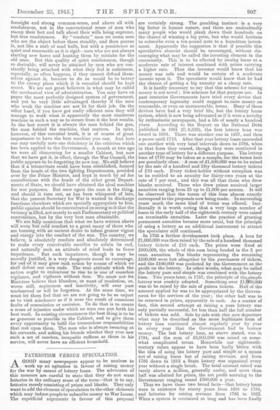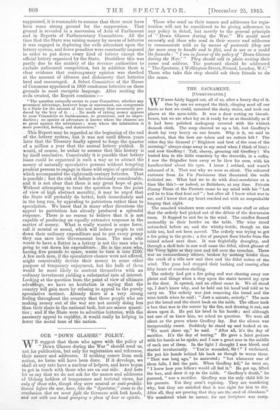PATRIOTISM VERSUS SPECULATION.
2iGOOD many newspapers appear to be anxious to work up an agitation in favour of raising money for the war by means of lottery loans. The advocates of this measure are careful to state that they do not want lotteries in the ordinary sense of the term—that is to say, lotteries merely consisting of prizes and blanks. They only want to add the element of speculation to the other elements which may induce people to subscribe money to War Loans. The superficial arguments in favour of this proposal are certainly strong. The gambling instinct is a very big factor in human nature, and there are undoubtedly many people who would plank down their hundreds on the chance of winning a big prize, but who would hesitate to subscribe even a ten-pound note to a humdrum invest- ment. Apparently the suggestion is that if possible this speculative element should be encouraged, without dis- couraging what may be called the investing element in the community. This is to be effected by issuing loans at a moderate rate of interest combined with prizes carrying a higher rate. Thus the investor would know that his money was safe and would be certain of a moderate income upon it. The speculator would know that ho had the chance of getting a big annuity at a cheap rate. It is hardly necessary to say that this scheme for raising money is not novel ; few schemes for that purpose are. In past centuries Governments have tried every device that contemporary ingenuity could suggest to.raise money on reasonable, or even on unreasonable, terms. Many of these devices have had a very brief life, but the lottery loans system, which is now being advocated as if it were a novelty by enthusiastic newspapers, had a life of nearly a hundred years. According to the Report on the National Debt published in 1891 (C. 6,539), the first lottery loan was issued in 1694. There was another one in 1697, and then a pause until 1710. After that year lottery loans succeeded one another with very brief intervals down to 1784, when in that form they ceased, though they were continued in another typo of lottery for a different purpose. The lottery loan of 1710 may be taken as a sample, for the terms here are peculiarly clear. A sum of £1,500,000 was to be raised by the sale of a hundred and fifty thousand lottery tickets of £10 each. Every ticket-holder without exception was to be entitled to an annuity for thirty-two years at the rate of 7 per cent., and this was all that those who drew blanks received. Those who drew prizes received larger annuities ranging from £5 up to £1,000 per annum. It will be observed that the terms of this loan almost exactly correspond to the proposals now being made. In succeeding years much the same kind of terms was offered. Inci- dentally it is worth noting that a very large number of loans in the early half of the eighteenth century were raised on terminable annuities. Later the practice of granting permanent annuities became more usual, but the principle of using a lottery as an additional instrument to attract the speculator still continued.
In 1755 a further development took place. A loan for £1,000,000 was then raised by the sale of a hundred thousand lottery tickets of £10 each. The prizes were fixed at £900,000, the whole of this sum being funded in the 3 per cent, annuities. The blanks representing the remaining £100,000 were lost altogether by the purchasers of tickets, and the £100,000 was pocketed by the Government as the profit on the lottery. In other words, what may be called the lottery pure and simple was combined with the lottery loan. Two years later, in 1757, the principle of the simple lottery was crudely adopted. Something over £1,000,000 was to be raised by the sale of guinea tickets. Half of the amount applied for was to be appropriated by the Govern- ment for the services of the year ; the other half was to be returned in prizes, apparently in cash. As a matter of fact, this second attempt at raising a pure lottery was only partially successful, for less than half the full number of tickets was sold. Side by side with this new departure what may be described as the more legitimate form of lottery loan continued almost regularly year by year in every year that the Government had to borrow money. The last lottery loan, as above stated, was in 1784, and the sum of £6,000,000 was raised on some- what complicated terms. Meanwhile our eighteenth- century rulers appear to have been badly bitten with the idea of using the lottery pure and simple as a means not of raising loans but of raising revenue, and from 1785 down to 1823 a State lottery was organized every year without a single break. The total amount raised was rarely above a million, generally under, and more than half was allotted for prizes, the net profit accruing to the Government ranging round £300,000 a year. Thus we have these two broad facts—that lottery loans were in existence for ninety years from 1694 to 1784, and lotteries for raising revenue from 1785 to 1823. When a system is continued so long and has been finally suppressed, it is reasonable to assume that there must have been some strong ground for the suppression. That ground is revealed in a succession of Acts of Parliament and in Reports of Parliamentary Committees. All the time that the State was raising money by means of lotteries it was engaged in deploring the evils attendant upon the lottery system, and fierce penalties were constantly imposed in order to put down every kind of lottery except the official lottery organized by the State. Doubtless this was partly due to the anxiety of the revenue authorities to exclude unlicensed competition, but in addition there is clear evidence that contemporary opinion was shocked at the amount of idleness and dishonesty that lotteries bred and encouraged. A Select Committee of the House of Commons appointed in 1808 condemns lotteries on these grounds in most energetic language. After reciting the evils created, the Report continues :- " The question naturally occurs to your Committee, whether any pecuniary advantage, however largo or convenient, can compensate to a State for the amount of vice and misery, thus necessarily pro- duced by the levy of it. . . , No mode of raising money appears to your Committee so burthensomo, so pernicious, and so unpro- ductive ; no species of adventure is known where the chances are so great against the adventurer ; none where the infatuation is mere powerful, lasting, and destructive."
This Report may be regarded as the beginning of the end of the lottery system, but it was not until fifteen years later that the Treasury finally agreed to forgo the quarter of a million a year that the annual lottery yielded. It would, of course, be unfair to assume that this history is by itself conclusive. Conceivably it is posaible that lottery loans could be organized in such a way as to attract the money of naturally speculative persons without tempting prudent persons to engage in those wild orgies 'of speculation which accompanied the eighteenth-century lotteries. That is possible ; but the risk of failure is obviously considerable, and it is not clear that there is any great hope of gain. Without attempting to treat the question from the point of view of high abstract morality, it may be urged that the State will probably do better, both immediately and in the long run, by appealing. to patriotism rather than to speculation. We know that in many other directions the appeal to patriotism has already produced a splendid response. There is no reason to believe that it is not capable of producing an equally extensive response in the matter of money. What is really wanted is some force, call it mental or moral, which will induce people to cut down their ordinary expenditure and to put every penny they can save into Government loans. The man who wants to have a flutter in a lottery is not the man who is going to out down his expenditure. He is the man who, having five pounds to spare, wants to turn it into £100. A few such men, if the speculative chance were not offered, might conceivably devote their money to some other purpose of temporary enjoyment, but the bulk of them would be more likely to content themselves with an ordinary investment yielding a substantial rate of interest. Looking at the question from the point of view of ultimate advantage, we have no hesitation in saying that the country will gain more by refusing to appeal to the purely speculative mstinct. Already there is a very strong feeling throughout the country that those people who are making money out of the war are not merely doing less than their share in the national task, but are mow quanti- ties ; and if the State were to advertise lotteries, with the necessary appeal to cupidity, it would really be helping to lower the moral tone of the nation.



































 Previous page
Previous page